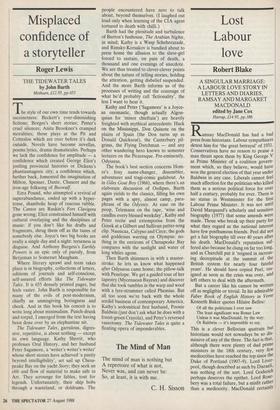Misplaced confidence of a storyteller
Roger Lewis
THE TIDEWATER TALES by John Barth
Methuen, £12.95, pp.655
he style of our own time tends towards succinctness: Beckett's ever-diminishing fictions; Borges's short stories; Pinter's cruel silences; Anita Brookner's cramped moralities; those plays at the Pit and Cottesloe which are over before it's dark outside. Novels have become novellas, poems lyrics, drama dramaticules. Perhaps we lack the confidence for amplitude — a confidence which created George Eliot's jostling provincial histories or Dickens's phantasmagoric city; a confidence which, further back, fomented the imagination of Milton, Spenser, Dante, Chaucer and the iron-age folksong of Beowulf.
Ezra Pound, who attempted a revival of superabundance, ended up with a hyper- tense, shambolic heap of raucous rubble. The Cantos are Ruskin's Fors Clavigera gone wrong; Eliot constrained himself with cultural overlaying and the disciplines of music: if you don't like his drafts and fragments, shrug them off as the tunes of somebody else. Joyce's two big books are really a single day and a night: terseness in disguise. And Anthony Burgess's Earthly Powers is an epic only of parody, from Betjeman to Somerset Maugham.
Where literary sprawl and teem takes place is in biography, collections of letters, editions of journals and self-conscious, self-assured efforts like The Tidewater Tales. It is 655 densely printed pages, but feels vaster. John Barth is responsible for many of the evils of post-modernism, chiefly an unmisgiving boringness and cheek. And in this book his conceit is to write long about minimalism. Punch-drunk and torpid, I emerged from the text having been done over by an elephantine nit.
The Tidewater Tales, garrulous, digres- sive, repetitive, is about nothing — except its own language. Kathy Sherrit, who professes Oral History, and her husband Peter Sagamore, a 'writer's writer's writer' whose short stories have achieved 'a purity beyond intelligibility', set sail up Chesa- peake Bay on the yacht Story; they seek an ebb and flow of material to make safe in Art. They scrounge for fables, tout for legends. Unfortunately, their ship bobs through a wasteland, or doldrums. The people encountered have zero to talk about, beyond themselves. (I laughed out loud only when learning of the CIA agent tortured to death with chilli.) Barth had the plenitude and turbulence of Burton's funhouse, The Arabian Nights, in mind; Kathy is a Wasp Scheherazade, and Rimsky-Korsakov is bandied about to press home the allusion to the slave-girl forced to sustain, on pain of death, a thousand and one evenings of anecdote. We are thus treated to clever-clever points about the nature of telling stories, holding the attention, getting disbelief suspended. And the more Barth informs us of the processes of writing and the cozenage of what he'd probably call 'fictionality', the less I want to hear it.
Kathy and Peter ('Sagamore' is a Joyce- an onomastic, though actually Algon- quian for 'minor chieftain') are heavily freighted with mythical antecedents: Huck on the Mississippi, Don Quixote on the plains of Spain (the Don turns up as Donald Quicksoat), the Canterbury pil- grims, the Flying Dutchman — and any other wandering hero known to semester lectures on the Picaresque. Pre-eminently, Odysseus, The book's best section concerns Hom- er's foxy name-changer, dissembler, adventurer and tragi-comic gadabout. As in Giles Goat Boy (1966), where there's an elaborate discussion of Oedipus, Barth again yields to the classics, filling his own pages with a spry, almost camp, para- phrase of the Odyssey. At ease on the poop, Telemann on the tape, 'wine and candles every blessed weekday', Kathy and Peter recite and extemporise from the Greek at a Gilbert and Sullivan patter-song clip. Nausicaa, Calypso and Circe; the gods and goddesses warring on Olympus: no- thing in the environs of Chesapeake Bay compares with the sunlight and water of long whiles agone.
Then Barth shimmers in with a master- stroke: he lets us know what happened after Odysseus came home; the pillow-talk with Penelope. We get a guided tour of her tapestry (Mycenaean Bayeux) and discover that she took tumbles in the warp and woof with a lyre-strummer called Phemius. But all too soon we're back with the whole sordid business of contemporary America, Kathy's sodomitical first husband, Poonie Baldwin (just don't ask what he does with a forest-green Crayola), and Peter's reversed vasectomy. The Tidewater Tales is quite a floating opera of imponderables.














































 Previous page
Previous page